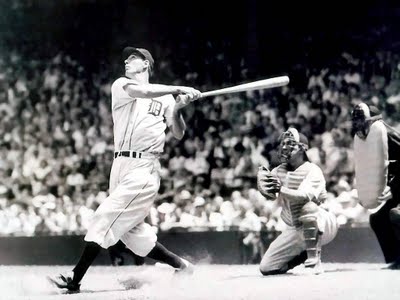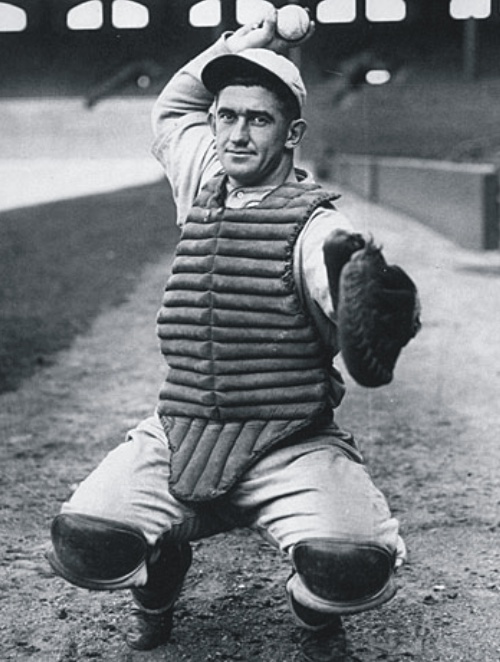Was Hank Greenberg Once Not Chosen for the All-Star Game Despite Having 100 RBI at the Break and His Own Teammate Selecting the Team?
Here is the latest in a series of examinations into urban legends about baseball and whether they are true or false. Click here to view an archive of the baseball urban legends featured so far.
BASEBALL URBAN LEGEND: A baseball player was not selected for the All-Star Game even though he had over 100 runs batted in at the All-Star Break and his own manager/teammate was picking the team!!
With the Major League Baseball All-Star Game tomorrow, I figured I’d spotlight a pair of All-Star legends today and tomorrow! Both involve the Tigers, oddly enough.
Hank Greenberg was one of the most dominant hitters in Major League history. Think Albert Pujols in his first nine seasons, or Frank Thomas in his first nine seasons. That’s how good Greenberg was (and, like Pujols and Thomas, he was a first baseman). Although he had a relatively short career, he still put up big-time numbers and was elected to the Baseball Hall of Fame in 1956.

But as great of a player as he was in his heyday, he still had a bit of a problem standing out.
You see,at the same time Greenberg was lighting up the ballparks as a 24 year old in 1935, two OTHER first basemen were doing similar things in the American League, and both of the other players were ALREADY famous. One of them is the aforementioned Jimmie Foxx, who won the American League MVP Award in 1932 and 1933 (he was three years older than Greenberg). The other was Lou Gehrig, the famed Iron Horse of the New York Yankees, who had four years on Foxx, and had won the MVP in 1927 and come in second in 1931 and 1932.
So when the All-Star Game was introduced in 1933 (initially intended as a one-time event), Gehrig was the starting first baseman and Foxx had to settle for a reserve spot (even though, as I noted, Foxx won the MVP that year). That first year, the managers for the game were Connie Mack and John McGraw (McGraw came out of retirement for the event). When the game became an annual tradition in 1934, so, too, did the tradition begin of the manager of the previous year’s pennant-winning club choosing the players for that season’s All-Star Game (it would not be until after World War II that the fans began to get a vote).
In 1935, that manager was Detroit Tiger manager/player Mickey Cochrane (as the Tigers had lost to the Cardinals in the World Series the year before)….

Well, at the All-Star Break, Greenberg had 103 runs batted in, an “at the All-Star Break” record that stands to this day (I think Juan Gonzalez came the closest to it in 1998, with, like, 101 or 102 ribbies).
Cochrane, though, made a surprising decision.
Cochrane felt that Foxx and Gehrig both deserved it over Greenberg, so Cochrane repeated the strategy the previous year’s manager, Joe Cronin, employed, which was to have Foxx play out of position at third base and have Gehrig play first.
You still would have thought Cochrane would have managed to find a spot for Greenberg, as he DID select other back-up position players (all the teams were represented, so that wasn’t an issue), including a back-up third baseman (Ossie Bluege, who also backed up second and short). However, the rosters WERE a lot smaller at the time, so perhaps Cochrane felt he needed a back-up who could play multiple positions?
Of course, Cochrane also had to carry a third catcher because, naturally, he chose himself to be on the team and he decided not to play, so he needed a back-up catcher (Cochrane was a Hall of Fame catcher, and he had an amazing year in 1935 so he certainly deserved the honor, it’s just weird to see him snub his outstanding teammate at the same time).
The next year, Greenberg was hurt so he made Cochrane’s (picking again as the Tigers won the 1935 World Series) pick easy.
The following year, Yankees’ skipper Joe McCarthy gave Greenberg his first All-Star appearance (they also expanded the roster in 1937, so that certainly did not hurt). Well, I should probably put appearance in quotes, as Greenberg did not get an at-bat in the game.
He was so irked by the whole situation that when McCarthy picked him again the next year, he refused to show up (that year, by the way, McCarthy played Foxx over his own player, Gehrig).
The next year, though, Greenberg was chosen as a starter and he showed up to play in the game. He batted fifth and went 1 for 3 in an American League victory.
Being easily the most famous Jewish ballplayer there was at the time, it was quite an honor to finally be accepted by his peers as the best first baseman out there!
The legend is…
STATUS: True
Feel free (heck, I implore you!) to write in with your suggestions for future installments! My e-mail address is bcronin@legendsrevealed.com.





